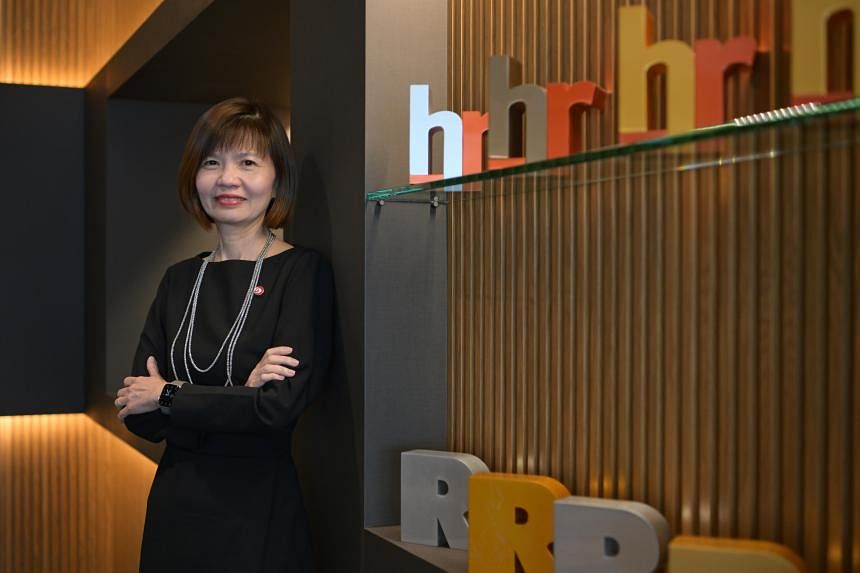SINGAPORE - OCBC Bank is investing $30 million over the next three years to help staff progress in their careers and prepare them, as well as the organisation, for future disruptions.
Senior leaders who volunteer will be trained and certified as career coaches as part of the new initiatives. Employees will also be able to tap an artificial intelligence-driven career marketplace to track their existing skill sets, identify job opportunities within the bank, and see the skills they need to acquire to get there.
Ms Lee Hwee Boon, OCBC’s head of group human resources, told The Straits Times that the moves are part of a strategy for “managing a workforce through the rough seas”.
“Given the trends that we’re seeing – the disruption, the acceleration of technology changes in the workplace – we needed to invest in our workforce so that it is more resilient, so we have a workforce where there is breadth in skills, not just technical domain expertise,” she said.
She added that when a war for talent breaks out, levers like higher salaries or promotions are only short-term solutions to retain staff.
“The idea really is to say, what is the most intrinsic way to continue to motivate and engage our employees, and help them have a career with us? It is about continuing to allow people to have opportunities within the OCBC Group.”
The $30 million figure builds on the $50 million the bank invested in learning programmes over the past five years.
Senior leaders who have deep experiences and are passionate about guiding younger colleagues can sign up to be trained as career coaches, said Ms Lee.
The bank has launched its internal coaching certification programme, which is in line with the International Coaching Federation’s framework, and aims to certify 60 coaches in the first 12 months.
All employees will be eligible for career coaching from these internal coaches. This differs from typical approaches where corporates provide career coaches only for senior employees.
Ms Lyn Lee, 48, OCBC’s head of group legal, is among the first batch of 22 coaches currently on the four-month training programme.
They will be matched to coachees from January 2024. Meanwhile, they are boning up on skills like active listening and how to ask questions to help coachees unpack what is important to them in their career and what they want to achieve.
Besides making time during office hours to attend training – two full days at the start and then half-day sessions every other week – the trainees also do peer coaching practice sessions for up to an hour each time, sometimes at 8am in the morning or 10pm at night, she said.
Despite the challenges, she said she is eager to pay forward the help she has received from others in her own career. For example, one of her mentors, a senior lawyer, was instrumental in encouraging her to take up the opportunity to move into a bigger role 11 years ago and was supportive as she expressed her “deepest fears”.
“I want to help others also grow and succeed in their own lives,” she said, adding that coaches like her get to hone their leadership skills that can be used with their teams or even at home.

The initiative also builds a culture of coaching at the bank, where “you don’t feel judged” for getting help to work through an issue, Ms Lee said.
Another part of OCBC’s investment is in new or refreshed programmes in areas such as career mobility, sustainability, data and technical banking skills, adding to its slate of more than 14,000 internal courses developed by 2022.
The number of leadership programmes, in particular, grew by more than five times over the last five years.
A core component in OCBC’s plans is its career marketplace, which is being piloted from November. It will be launched bank-wide in the first quarter of 2024, followed by group-wide to more than 30,000 staff globally in the second quarter.
Ms Lee Hwee Boon said the career marketplace goes beyond a regular job portal to deliver personalised recommendations on roles within the bank, by sifting through employees’ skill sets based on their existing roles, the courses they have completed, and the competencies required for the various job openings.
It will provide a basis for managers to look at possible adjustments to employees’ job scopes and, in the future, for workers to apply for short-term “gigs” outside their regular roles, to build their skills, she said.
The career marketplace uses the Future Skills Accelerator platform developed by the Institute of Banking and Finance, AI start-up JobTech, and accounting firm PricewaterhouseCoopers. OCBC is part of the pilot group of 15 financial institutions involved in the development of the platform, which was launched in 2022.
Noting that young people tend to be more focused on experiences than careers, Ms Lee said the tool will enable them to find opportunities to meet those aspirations within the bank.
This should lower attrition, she said. “In the past if they want a different experience, they leave, find another experience elsewhere.”
The bank will also be able to say to an employee facing disruption, “no fear, the job has gone, but there is another one that is consistent with your skill sets that I can move you into”.
An internal move is how Ms Donna Teo, 44, entered her current role as a data analyst in the bank’s group data office two years ago. She had been in the consumer financial services digital business team, which works on boosting the sales of OCBC products through the bank’s online channels.
With her marketing experience and a background in web programming, Ms Teo wanted to learn data skills to become an all-rounder, but felt she did not have the expertise needed for data roles outside the bank.

So she jumped at the chance when she found out about the opening in her current team, and took up a data analytics certification course developed by OCBC and Ngee Ann Polytechnic.
“I had a lot of uncertainty over whether I can learn new things at my age,” she said.
“But the transition was quite smooth because everybody shares knowledge and there is a lot of information in our centralised portal.”


